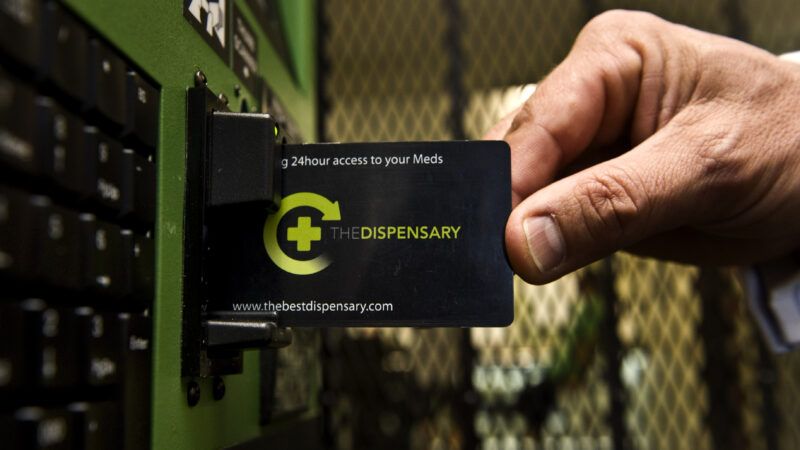Marijuana Banking Legalization Gets Scrapped Again
Members of Congress keep saying they want to allow state-legal pot businesses to have access to the banking system, but they keep refusing to actually do it.

For a sixth time, the Secure and Fair Enforcement (SAFE) Banking Act has been scrapped by the U.S. Senate just before earning a vote. The proposal would grant state-legal marijuana businesses access to federally insured banks.
The latest blow to the SAFE Banking Act came Thursday when senators stripped the proposal out of the America COMPETES Act, a House-passed bill that aims to subsidize computer chip manufacturers and other industries. The inclusion of the SAFE Banking Act was one of the few redeemable aspects of the COMPETES Act, which is mostly a cronyist mess of disjointed giveaways to politically connected industries.
House Democrats had included the marijuana banking provision in the otherwise unrelated bill in an attempt to finally get the SAFE Banking Act through the Senate, where it has repeatedly stalled. The most recent failure came in December when Senate Majority Leader Chuck Schumer (D–N.Y.) had the proposal stripped out of the National Defense Authorization Act. As Reason's Jacob Sullum has reported, Schumer wants to prioritize his own, broader marijuana legalization effort over what he sees as piecemeal moves like the banking reforms.
To be sure, Congress should move immediately to legalize weed. But a perfect solution seems to have become the enemy of a good solution, and state-legal pot shops and growers find themselves caught in legal limbo.
"If there is a legislative version of The Twilight Zone, the SAFE Banking Act seems to be stuck in it," says Morgan Fox, political director for the National Organization for the Reform of Marijuana Laws (NORML), a nonprofit that advocates for legalizing marijuana. "It is incredibly disappointing that politics continue to get in the way of saving lives and helping struggling small businesses disrupt and ultimately replace the underground cannabis market."
A standalone version of the SAFE Banking Act has now been sitting in the Senate for more than three years, noted Rep. Ed Perlmutter (D–Colo.), the bill's sponsor, on Twitter. It cleared the House of Representatives in 2019 with a bipartisan vote of 321–103.
"The Senate continues to ignore the public safety risk of forcing cannabis businesses to deal in all cash," wrote Perlmutter, who promised to keep trying to attach the proposal to other bills in addition to pushing the Senate to adopt the stand-alone measure.
Indeed, the lack of access to the federally insured banking system continues to be a very real threat to the country's growing marijuana industry. Some weed entrepreneurs have been able to find access to nontraditional banks, but many others continue to have to act like criminals and deal entirely in cash, making them targets for actual criminals. Beyond those risks, it's obviously harder to do basic business tasks—like paying your taxes and your employees—without access to banks.
There's broad support for the SAFE Banking Act within the banking industry too. Marijuana Moment, a trade publication, points out that banking associations representing all 50 states and one U.S. territory and the Independent Community Bankers of America have voiced support for the bill.
Medical marijuana is now legal in 37 states. Recreational weed is legal in 19 states and quasi-legal in Washington, D.C. There were $25 billion of legal sales of marijuana made last year by an industry that employs over 400,000 Americans. There is, quite frankly, no good reason for Congress to continue excluding those businesses and people from the security of the federal banking system.

Show Comments (27)